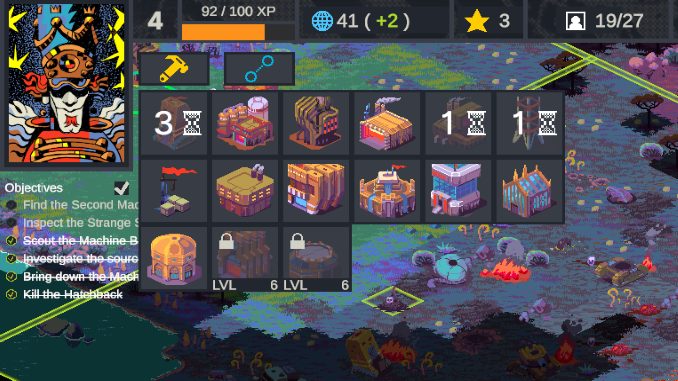When you open up the first map of the new strategy game Cantata, you’re confronted at once with a barrage of blues, pinks and greens. To me, it looked a little like the cover of a pulp sci-fi novel, or the marbled endpaper of an old book, with bright secondary colors swirling together. The landscape is immediately dramatic, but your focus, at first, is on the people inhabiting it: your commanding officer, the Shotar of Mars, is on this planet basically by accident, having chased his enemy, an AI named Vashti, and her army across the galaxy.
After some short exposition, I was free to scroll around the map. In the bottom left corner, just barely in my view, I saw a tile that was on fire, its muted brown-green punctuated by shattered metal and flames. When I clicked on it, I saw it was labeled simply “hurt earth.”
Cantata is a sci-fi strategy game by Afterschool Studio, which was released in Early Access on May 12. It is set on Shoal, a small planet on the edge of the galaxy. While you start off controlling the invading force, the game takes care to emphasize and center the planet itself as a character. It takes its own turn, just as you do; it spawns creatures to attack both your forces and your enemies’, materializing out of thin air. It’s clear from the first moments of the campaign that as bright and beautiful as the landscape appears, you are unwelcome here.
This is further emphasized by the game’s extreme difficulty, at least at this early stage. Gameplay in Cantata combines point and click combat with base-building elements, which involve building a network of factories that supply each other with resources. Most actions you can take are simple. Your units can move and attack, or load into vehicles to travel faster. You can build factories and make supply lines between them, a process I didn’t get the hang of even within several hours of play.
You have a shared pool of action points among your units, which is also used for building structures. Planning is key, and any attempt to push forward too quickly, as I found out, is punished by death. It’s very easy to get yourself into a spiral of resource deficit. Managing your global supply, what amounts to your building resources, is extremely important and easy to lose track of. Even in the very first level, I had to restart several times to find this balance, but this trial and error was varied enough to be interesting rather than frustrating.
Right now, Cantata is in phase one of early access, with the first three campaigns available. As more scenarios are released, you’ll eventually be able to play as three different leaders from each of the three factions: the human 11th Reign of Harmony and Prosper, their AI enemies the Unified Spirit, and the People of Sun and Shadow, inhabitants of Shoal who are a third party in their war.
On the game’s menu screen, there’s a disclaimer that reads “Cantata is a game made by a multinational team of developers, with themes of war, conflict and oppression. We oppose any and all real-world instances of this.” Cantata is not only intentional about its depiction of war, as this statement makes clear, but self-aware about the nature of strategy games generally. In his analysis of Crusader Kings 3, Sam Dibella argues that the game’s system of land inheritance is fundamentally orientalist, because it “models the feudalism of Christian Europe but also treats all other cultures as if they operate under the same kind of titular divisions. The idea that land could be conceived of in another way is simply missing.” This concern with land ownership and passage from one power to another is inherent to the premise of plenty of strategy games, but Cantata makes it clear that a compelling narrative can arise without it. While (at times) you play as characters who want to take over Shoal or discard it, you can also play as the planet’s inhabitants, with the planet itself on your side. Either way, Shoal has its own weather, animals, patterns and desires, separate from you. Thinking you could own it is a deadly mistake.
By making the earth itself a force that takes its own turns, pushes back against its enemies, and has its own voice and wants, Cantata destabilizes the usual view of land in strategy games as something to own and control. You can advance, but you’ll always be worrying about what can come behind you, always on the back foot when you venture somewhere new. This instability conjures a new relationship to the genre, and I’m excited to see how Cantata complicates this when it releases in full.
Emily Price is a PhD Candidate in literature at the CUNY Graduate Center. She is also a columnist at Unwinnable Magazine writing about media objects and their relationship to the past. She can be found on Twitter @the_emilyap.
